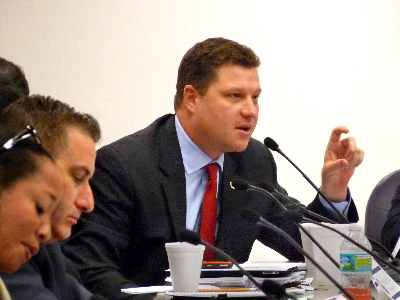Above photo: Sen. Jeff Brandes, R-St. Petersburg, who previously said that USF St. Petersburg has no “vision,” now wants to know what community’s concerns are and enlisted interim Regional Chancellor Martin Tadlock to find them. Courtesy of Wikimedia Commons
By Jeffrey Waitkevich
The state senator who says USF St. Petersburg is a school without a vision now apparently wants to ease some of the campus’ concerns about legislation that would abolish its independent accreditation.
Through an aide, Sen. Jeff Brandes, R-St. Petersburg, asked interim Regional Chancellor Martin Tadlock to assemble concerns from the community about House Bill 423, which would consolidate the three campuses in the USF system under the control of Tampa.
Brandes and Rep. Chris Sprowls, R-Palm Harbor, the chief sponsor of the measure, did not respond to calls and emails from The Crow’s Nest last week.
But the Tampa Bay Times reported that Brandes has shared with Sprowls what he has heard from Pinellas County, where the proposal has prompted strong opposition.
According to an editorial in the Times, which has called for guarantees that St. Petersburg will be treated fairly, Sprowls plans to “add details” designed to ease criticism of the proposal.
Tadlock said last week that he sent a list of five primary concerns to Brandes.
The list, he said, was assembled with the help of USF St. Petersburg Campus Board chair Stephanie Goforth and based on conversations with business and economic leaders in Pinellas County and retirees, faculty and students of the university.
Those five concerns are:
- We will lack the research support needed to contribute to pre-eminence.
- We do not have the same university model and resources needed that are available at USF Tampa to support student success (degree completion) at the level expected of a pre-eminent university.
- We will be less accessible to Pinellas County students and lose our identity as St. Petersburg’s university.
- Campus-based leadership/governance structure will be lost and local control of governance, budget, curriculum, faculty and staff qualifications, etc. will be lost.
- There will not be equitable distribution of funds.
Central to the current debate is the “pre-eminent state university” status that USF Tampa has achieved this year for the first time. With that designation, USF Tampa will get substantially more money from the Legislature.
Sprowls has said his consolidation proposal would ensure that the St. Petersburg and Sarasota-Manatee campuses would eventually get some of that pre-eminence money, too.
But in St. Petersburg, where leaders remember years of Tampa neglect, there is fear that the campus would be shortchanged if it loses its independent accreditation.
Last month, Tadlock took 12 concerns of his own to Tallahassee, many of which overlap with the five he sent to Brandes.
In an interview with The Crow’s Nest two weeks ago, Brandes brushed aside concerns about the consolidation proposal and how it was sprung – without advance notice – in the second week of the legislative session.
He also criticized the St. Petersburg campus, saying it lacked vision.
In Tallahassee, where legislators were absorbed last week in debates about gun control, there has been no action on the USF consolidation proposal since it was unanimously approved by a House subcommittee on Feb. 6.
Its next stop, the House Education Committee, could come this week.
Rep. Ben Diamond, D-St.Petersburg, said that he had heard amendments are in the works, but he declined to comment on them because he is working with fellow legislators on possible solutions.
The legislative session is scheduled to end March 9.



